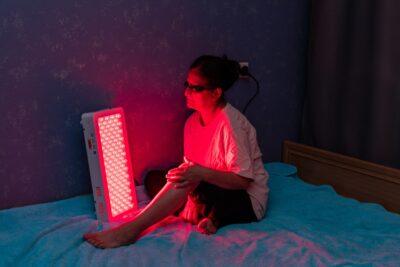
We live in an era dominated by glowing screens and digital distractions. Our lives (and our kid’s lives) have become increasingly sedentary, confined indoors, devoid of the natural rhythms of light energy and outdoor activity. The consequences of this shift are more profound than most realize.
The benefits of light, especially sunlight and red light, are transformative for our health, offering metabolic and cellular advantages that extend far beyond just a sunny disposition. This article explores the incredible power of light in enhancing our well-being, particularly in light of emerging research linking it to metabolic rates, immune function, and recovery from conditions like long-covid.
The Science of Light and Its Impact on Health
Light is more than just illumination. It’s a life force that affects our bodies on a cellular level. Natural sunlight, particularly in the morning, plays a critical role in setting our circadian rhythms… the internal clocks that govern sleep, metabolism, and overall energy. When we spend time outdoors, our bodies respond by producing serotonin, a neurotransmitter that boosts mood, and by synthesizing vitamin D, essential for bone health and immunity.
Emerging technologies such as red light therapy capitalize on these benefits. Red light therapy involves exposing the skin to low wavelengths of red and near-infrared light, penetrating cells, and stimulating mitochondrial function.
The mitochondria, often called the cell’s powerhouse, respond by producing more adenosine triphosphate (ATP), the body’s energy currency. This increase in cellular energy enhances overall vitality, improves skin health, and can help regulate blood glucose levels by increasing insulin sensitivity.
Metabolism, Light, and Energy
Research has shown that exposure to sunlight correlates with increased metabolic rates. On average, metabolic activity is higher in sunny weather, partly due to light’s role in stimulating thermogenesis and energy expenditure. Red light therapy offers a similar boost by targeting cells directly. Studies have demonstrated its ability to reduce blood glucose levels, making it an attractive adjunct for managing conditions like type 2 diabetes and metabolic syndrome.
Furthermore, this increase in cellular energy is vital for long-term health. By optimizing mitochondrial function, light therapy helps combat chronic fatigue, boosts metabolic rate, and enhances endurance, enabling people to feel more energetic throughout the day. The message here is simple: a daily dose of light… whether through outdoor activity or therapeutic interventions… can be a powerful tool for metabolic health.

After regular red light exposure, patients recovering from long COVID have shown improved white blood cell counts and oxygenation levels.
Light and Immune Function: Lessons from Long COVID
One of the most intriguing areas of research concerns light’s role in immune function and recovery from illnesses like long COVID. After regular red light exposure, patients recovering from long COVID have shown improved white blood cell counts and oxygenation levels. These benefits may be due to light’s ability to enhance nitric oxide release, improve blood flow and oxygen delivery, and boost mitochondrial energy production.
Interestingly, during the COVID-19 pandemic, undeveloped countries experienced significantly lower mortality rates compared to highly developed ones. While there were many contributing factors, the stark contrast in lifestyle patterns—greater time spent outdoors and lower reliance on screens in less-developed regions—undoubtedly played a role. Sunlight exposure supports robust immune function, and people in these countries likely benefited more than those who spent the pandemic in confined indoor spaces.
The Cost of Indoor Living
Despite the wealth of benefits light offers, most of us are living in the dark—quite literally. Statistics reveal that people spend approximately 90% of their time indoors, often glued to devices. This lack of natural light disrupts circadian rhythms, reduces metabolic efficiency, and compromises immune function. Blue light from screens further exacerbates the problem, interfering with melatonin production, essential for restorative sleep.
Prolonged indoor living also contributes to a sedentary lifestyle, which is strongly associated with obesity, diabetes, and cardiovascular diseases. The irony is stark: while our screens provide endless access to information about how to stay healthy, they also tether us to behaviors that degrade our physical and mental well-being.
Reconnecting with the Outdoors
If our devices are killing us slowly, the antidote is simple: reconnect with nature. Spending even 20 minutes a day outside can have measurable health benefits, from improved mood to enhanced energy levels. Red light therapy also offers a convenient and scientifically backed alternative for those unable to access consistent sunlight.
Consider these steps to incorporate more light into your life:
1. Prioritize Morning Sunlight: Step outside for a brief walk or coffee in the morning to kickstart your circadian rhythm.
2. Try Red Light Therapy: Use devices designed to deliver low wavelengths of red light, particularly during winter months or when sunlight is scarce.
3. Take Regular Breaks: Limit device usage with techniques like the Pomodoro method, ensuring you step outside during breaks.
4. Create a Light-Friendly Workspace: Position your desk near a window to maximize natural light exposure during the day.
5. Get Outside: Engage in sports, hikes, or gardening to reap the physical and mental benefits of being outside.
A Brighter Future Is Outside
As our reliance on screens grows, so too does our responsibility to counterbalance their effects. By stepping outside, embracing the healing power of light, and reducing our time spent in front of screens, we can reclaim our health, vitality, and connection to the natural world. The evidence is clear: light, whether from the sun or red light therapy, is essential for cellular energy, metabolic health, and immunity.
The question is always whether we’ll act on this knowledge or succumb to the creeping effects of “death by devices.” So the next time you’re tempted to scroll endlessly, pause. Look outside and step into the light, not just for your body but your mind, spirit, and a brighter future.


























